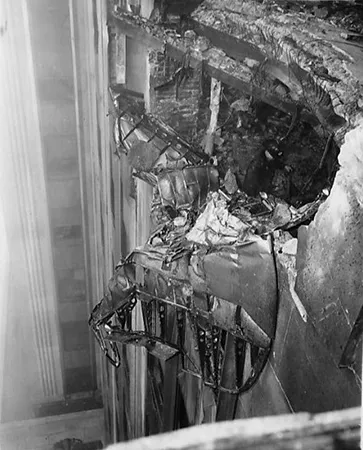70 Years Ago, a B-25 Bomber Crashed Into the Empire State Building
14 people died in the accident
/https://tf-cmsv2-smithsonianmag-media.s3.amazonaws.com/filer/a6/32/a632404e-a7af-4139-862f-e1a23984045a/empire_state_building_edit.jpg)
In September 2001, New York’s skyline was irrevocably changed when two planes crashed into the city’s iconic Twin Towers. But 9/11 wasn’t the first time the city was shocked by a plane crashing into one of its most symbolic buildings, Greg Young and Tom Meyers write on their NYC history blog, The Bowery Boys — 56 years earlier, the Empire State Building was the site of a spectacular plane crash.
On the morning of July 28, 1945, Lt. Colonel William Smith was trying to reach Newark Airport. Instead, he crashed into the Empire State Building and set it ablaze. The act wasn’t sabotage, write Meyers and Young. Rather, it was the result of bad weather.
Smith, who piloted a B-25 Bomber, had been tasked with a routine personal transfer from a military base in Bedford, Massachusetts, to pick up his commanding officer at Newark. That morning thick fog had settled on the city. Ground crews advised Smith that, with zero visibility, attempting to land was a bad idea.
In the fog, he found himself off course and flying over the city, Meyers and Young explain. Smith managed to swerve around the Chrysler Building, Rockefeller Center, and what’s known today as the Helmsley Building. At 9:40am, the bomber smashed into the 78th, 79th and 80th floors of the Empire State Building.
It was a Saturday, so most people had not come in to work. Still, 14 people, including three plane crewmembers and eight employees of the Catholic War Relief Office, died in the impact. The building’s elevator operator, Betty Lou Oliver, miraculously survived a 79-foot elevator fall (for which she holds a Guinness World Record).
The crash also caused a fire and tore an 18 by 20 foot hole in the north wall of the building, according to a New York Times report the next day. One engine even crashed through the building and hit a penthouse on the other side. A survivor likened the impact to an earthquake — and the crash burns bright in survivors’ memories, even if it’s been widely forgotten today.

/https://tf-cmsv2-smithsonianmag-media.s3.amazonaws.com/accounts/headshot/Screen_Shot_2014-01-27_at_12.05.16_PM.png)
/https://tf-cmsv2-smithsonianmag-media.s3.amazonaws.com/accounts/headshot/Screen_Shot_2014-01-27_at_12.05.16_PM.png)